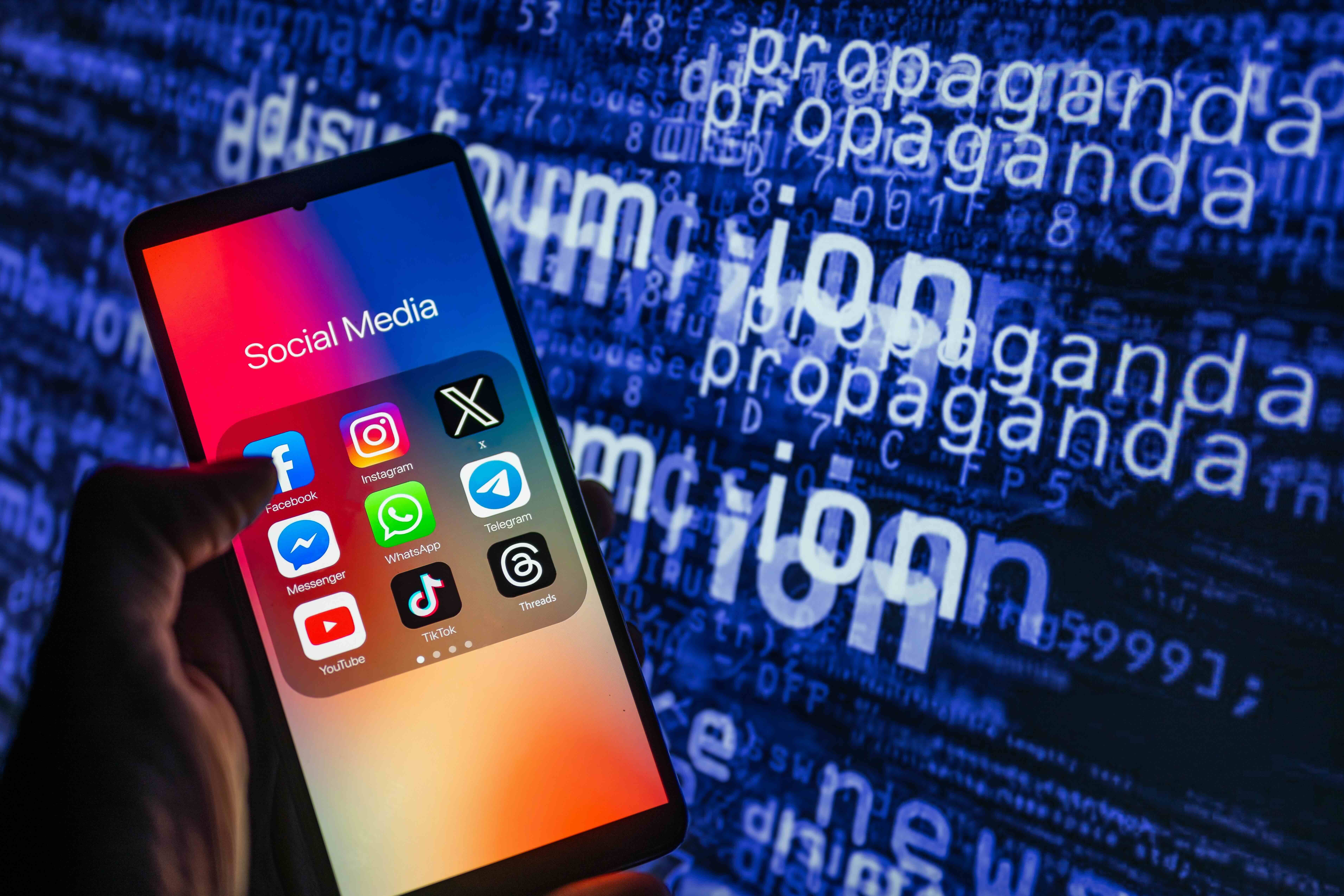#Up4Democracy
Disinformation wars: Protecting democracy in Africa’s digital age

Social media icons logo displayed on a smartphone with disinformation on screen seen in the background
© ShutterstockResearch by Chinasa T. Okolo, a fellow in the Center for Technology at Brookings suggests that advances in digital technology within Africa has inadvertently created an opportunity for the proliferation of disinformation across the continent. Generative Artificial Intelligence (Generative AI) is being used as a tool to advance disinformation through the creation of content that manipulates public opinion, and spreads false narratives, posing a direct threat to democracy.
Generative AI relies on user inputs to produce content that includes text, images, audio, and video. Popular examples include ChatGPT, Gemini, and Sora, an AI model that produces hyper-realistic videos.
Given the difficulty in identifying content that has been produced by Generative AI, users who are not aware of the existence of such tools are prone to deception by such content as it is readily available on social media.
Understanding disinformation: definition and mechanisms
Disinformation or “fake news” is the deliberate creation and distribution of information that is deceptive and misleading. Disinformation is prevalent with research suggesting that media consumers across the continent are frequently exposed to disinformation.
Generative AI was used to fuel disinformation during the 2023 presidential elections in Nigeria where there was a surge in fake endorsements from prominent figures. Following the election of Senegal’s president, Bassirou Diomaye Faye, in March 2024, a video claiming to depict the president giving a speech was widely distributed, however, the video was in fact depicting Ousmane Sonko with fact-checkers verifying that generative AI was used to translate his original speech, from French to English.
In South Africa, generative AI was used for political campaigning and at least four fake videos were uncovered during the 2024 presidential elections, these included a video portraying American rapper Eminem endorsing the Economic Freedom Fighters. Another video surfaced in March 2024 depicting US President Joe Biden stating that the US would sanction the country if the African National Congress wins the election.
Motivation for disinformation and its perpetrators
While those who develop disinformation content are motivated by ill-intent, the majority of individuals who participate in its dissemination often do so unintentionally due to limited digital and media literacy. Furthermore, research by the Africa Center for Strategic Studies reveals that 60% of disinformation campaigns are foreign-sponsored and primarily focused on supporting authoritarian governments and military juntas, this finding is further supported by data that shows that these campaigns are disproportionately targeted at West African countries with the region accounting for 43% of targeted disinformation campaigns further proving that foreign actors spread disinformation to destabilise political environments for strategic gain.
Domestically, political parties, government, and the media employ disinformation to achieve a wide-range of objectives. Governments distribute propaganda to maintain the current state of affairs. Governance practitioner, Delta Mbonisi Sivalo says that politicians use disinformation to undermine the opposition.
The impact of disinformation on democracy in Africa
Article 21 of the Universal Declaration of Human Rights asserts that all individuals have the right to participate in the government of their country. One of the ways African citizens are able to do this is through the ability to independently form opinions free from manipulation. Within this context, disinformation is a threat to democracy as it is a form of election interference that wrongfully influences voters’ opinions.
Sivalo adds that information disorders including misinformation, disinformation and mal-information (MDM) undermine voters’ ability to make decisions based on accurate beliefs about the political system, he adds that this poses a danger to the quality and legitimacy of the democratic process, as a well-informed electorate is essential for the collective autonomy of democracies. Moreover, disinformation that occurs in the context of unresolved historical tensions dismantles cohesion.
Disinformation during the August 2023 Zimbabwe general elections resulted in rumours that the Citizens Coalition for Change was boycotting the elections and discouraging citizens from casting voting. The fake news was supported by altered images. Another piece of fake news widely circulated on social media suggested that the Southern Africa Development Committee (SADC) had rejected the outcome of the 2023 Presidential elections. These occurrences illustrate how disinformation can lead to political instability.
AI-fuelled disinformation campaigns intensify existing issues affecting democratic processes within the African continent. Since 2020, nine military coups have occurred in Africa and political propaganda has been shown to impact coups before, during, and after they happen. A case in point is the December 2018 video claiming to portray the then president of Garbon, Ali Bongo and subsequently leading to a failed coup in 2019 as the video sparked concerns regarding his fitness to rule. Bongo has since been removed in a coup in August 2023.
Strategies for countering disinformation
The formation of independent fact-checking organisations in Africa has been critical in controlling the spread of disinformation, likewise, government regulation, public awareness campaigns, and increased oversight by social media platforms are also important elements in combatting disinformation.
While generative AI has been exploited as a tool to undermine democracy in Africa through disinformation, it also holds significant promise in detecting and combating such threats. Fully harnessing its potential could play a crucial role in safeguarding democratic systems across the continent.
